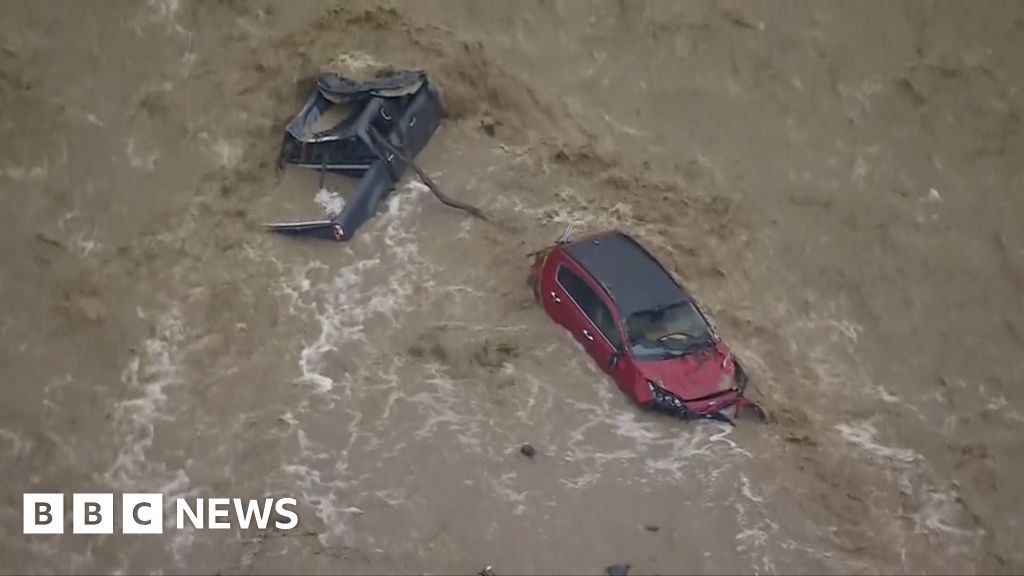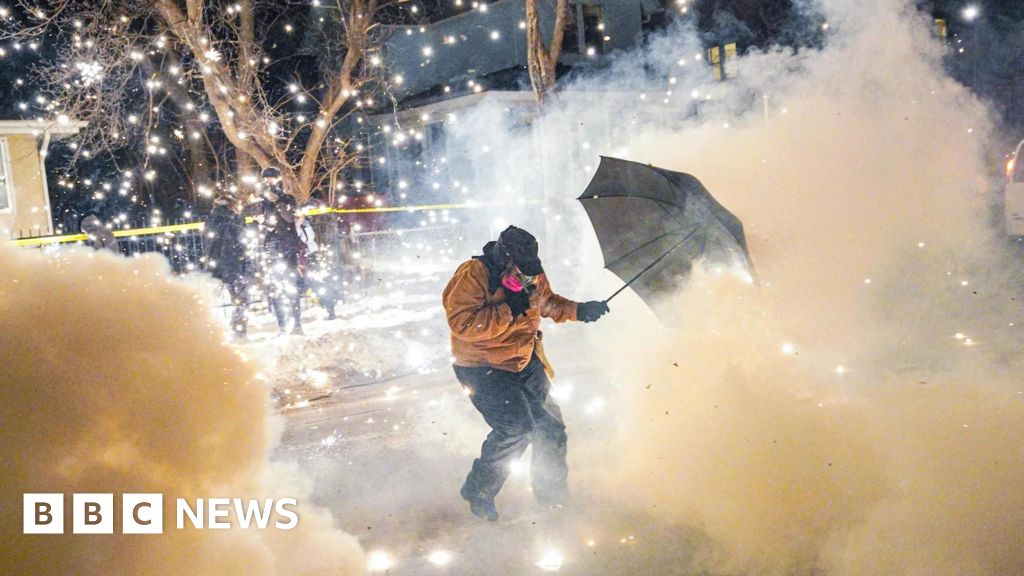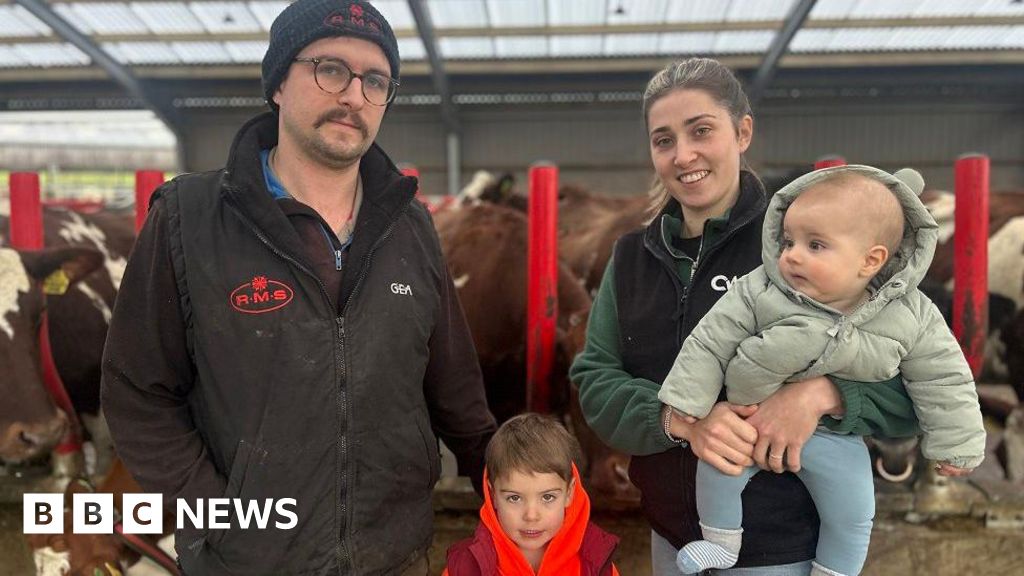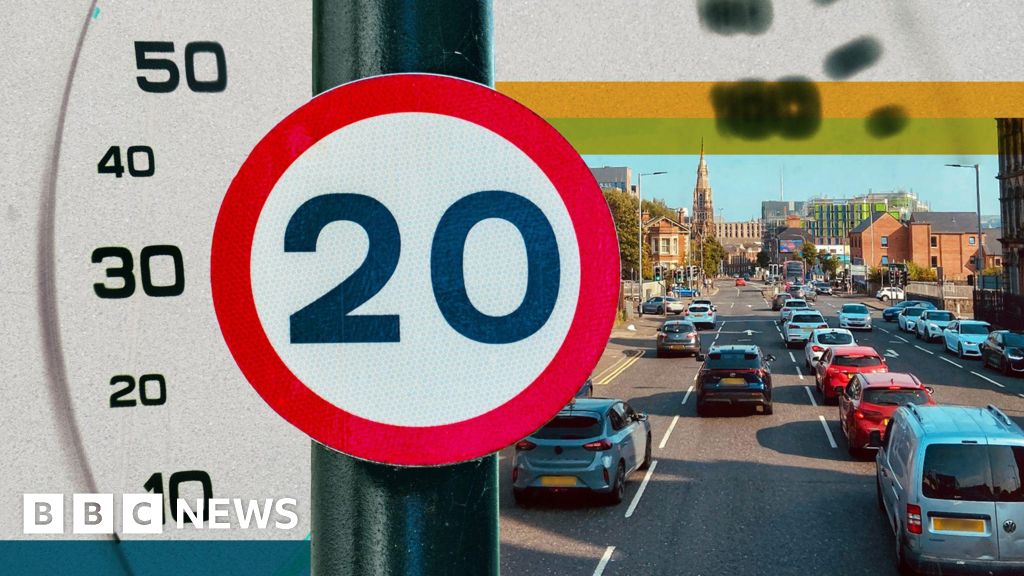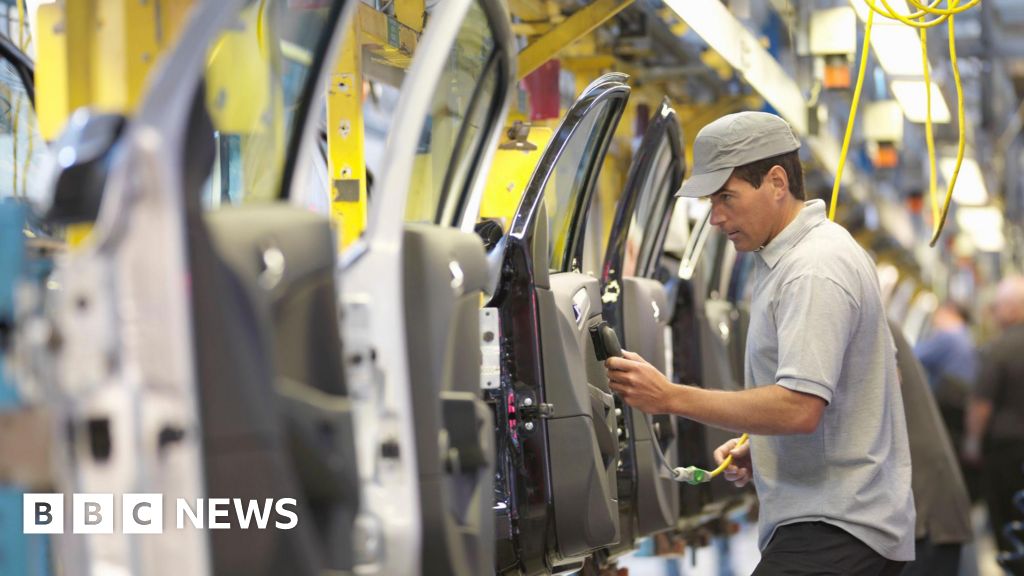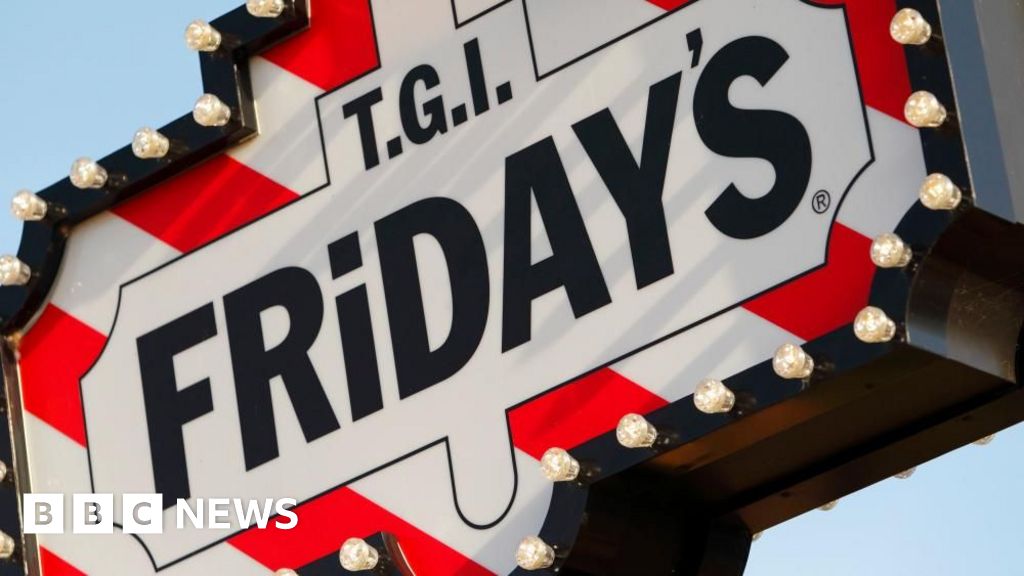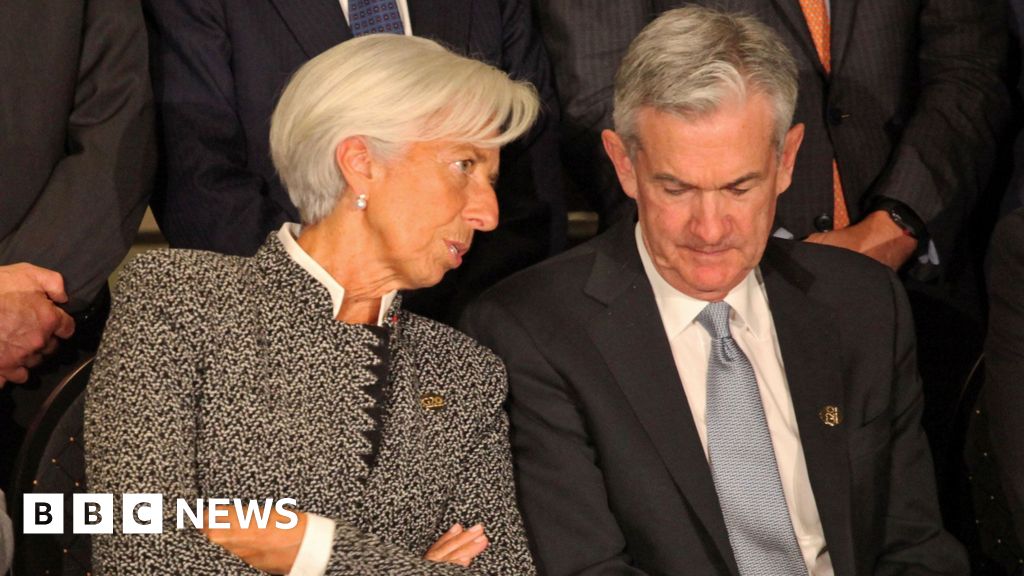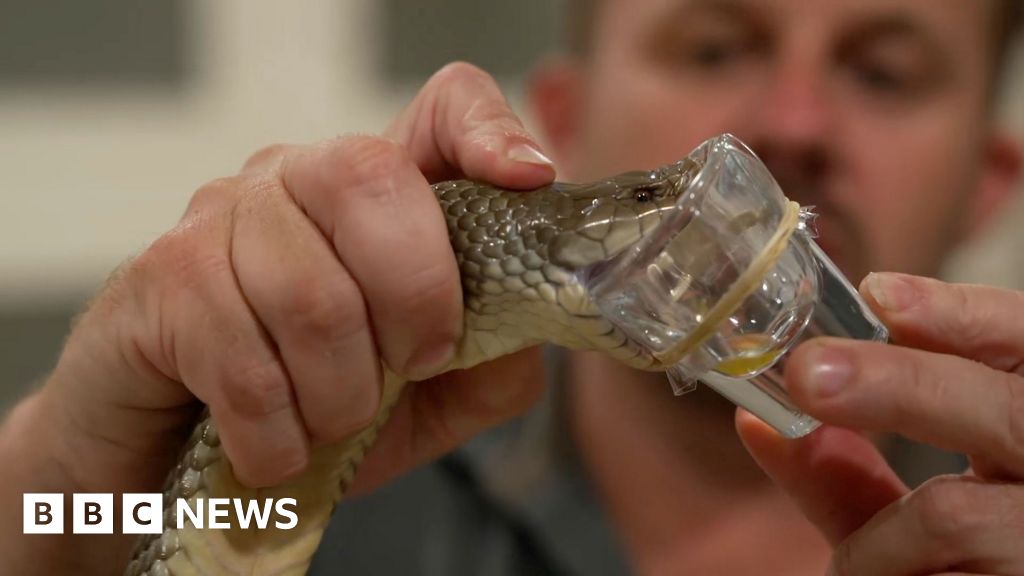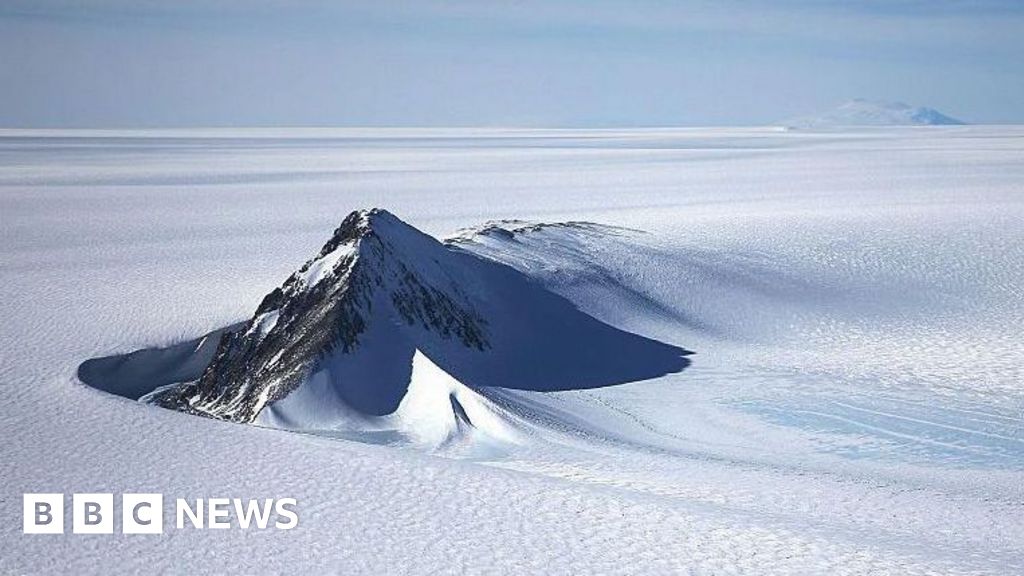Australia correspondent
With a pair of bright pink tweezers in hand, Emma Teni is delicately wrestling a large and leggy spider in a small plastic pot.
“He’s posing,” the spider-keeper jests as it rears up on its back legs. It is exactly what she’s trying to achieve – that way she can suck the venom from its fangs using a small pipette.
Emma works from a tiny office known as the spider milking room. On a typical day, she milks – or extracts the venom from – 80 of these Sydney funnel-web spiders.
On three of the four walls there are floor-to-ceiling shelves stacked full of the arachnids, with a black curtain pulled across to keep them calm.
The remaining wall is actually a window. Through it, a small child stares, both fascinated and horrified, as Ms Teni works. Little do they know that the palm-sized spider she’s handling could kill them in a matter of minutes.
“Sydney funnel-webs are arguably the most deadly spider in the world,” Emma says matter-of-factly.
Australia is famously full of such deadly animals – and this room at the Australian Reptile Park plays a critical part in a government antivenom programme, which saves lives on a continent where it’s often joked that everything wants to kill you.
‘Spider girl’
While the quickest recorded death from a Sydney funnel-web spider was a toddler at 13 minutes, the average is closer to 76 minutes – and first aid gives you an even better chance of surviving.
So successful is the antivenom programme here at the Australian Reptile Park that nobody has been killed by one since it started in 1981.
The scheme relies, however, on members of the public either catching the spiders or collecting their egg sacs.
In a van plastered with a giant crocodile sticker, each week Ms Teni’s team drives all over Australia’s most famous city, picking up Sydney funnel-webs that have been handed in at drop-off points such as local veterinary practices.
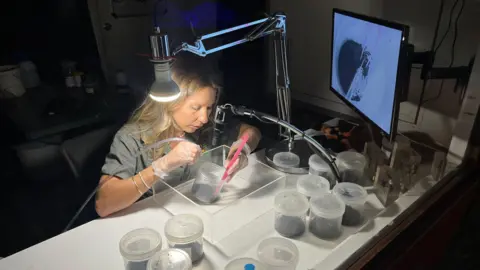
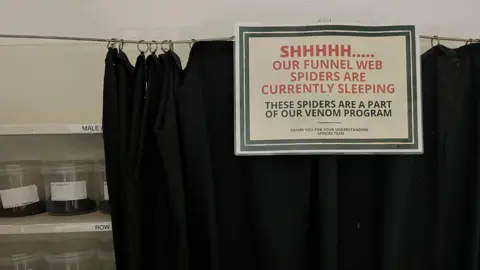
There are two reasons why these spiders are so dangerous, she explains: not only is their venom extremely potent, but they also live exclusively in a densely populated region where they’re more likely to encounter humans.
Handyman Charlie Simpson is one such person. He moved into his first home with his girlfriend a few months ago, and the keen gardener has already found two Sydney funnel-webs. He took the second spider to the vet, where Ms Teni picked it up shortly after.
“I had gloves on at the time, but realistically I should have had leather gloves on because their fangs are so big and strong,” the 26-year-old says.
“I [just thought] I had better catch it because I kept getting told you’re meant to take them back to be milked, because it’s so critical.”
“This is curing my fear of spiders,” he jokes.
As Ms Teni offloads one arachnid that was delivered to her in a Vegemite jar, she stresses her team isn’t telling Australians to go looking for the spiders and “throw themselves into danger”.
Rather, they’re asking that if someone comes across one, they safely capture it rather than kill it.
“Saying that this is the world’s most deadly spider and then [asking the public to] catch it and bring it to us does sound counter-intuitive,” she says.
“[But] that spider there now, thanks to Charlie, will… effectively save someone’s life.”
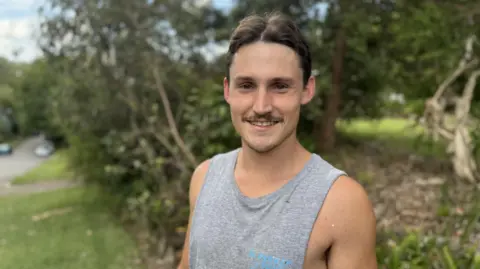
All of the spiders her team collects get brought back to the Australian Reptile Park where they are catalogued, sorted by sex and stored.
Any females that get dropped off are considered for a breeding programme, which helps supplement the number of spiders donated by the public.
Meanwhile, the males, which are six to seven times more toxic than the females, are used for the antivenom programme and milked every two weeks, Emma explains.
The pipette she uses to remove the venom from the fangs is attached to a suction hose – crucial for collecting as much venom as possible, since each spider provides only small amounts.
While a few drops is enough to kill, scientists need to milk 200 of these spiders to have enough to fill one vial of antivenom.
A marine biologist by training, Emma never expected to spend her days milking spiders. In fact, she started off working with seals.
But now she wouldn’t have it any other way. Emma loves all things arachnid, and goes under various nicknames – spider girl, spider mama, even “weirdo”, as her daughter calls her.
Friends, family and neighbours rely on her for her knowledge of Australia’s creepy crawlies.
“Some girls arrive home to flowers on their doorstep,” jokes Emma. “For me it’s not unusual to arrive home to a spider in a jar.”
The best place to be bitten?
Spiders represent just one small part of what the Australian Reptile Park does. It’s also been providing snake venom to the government since the 1950s.
According to the World Health Organisation, as many as 140,000 people die across the world from snake bites every year, and three times that many are left disabled.
In Australia though, those numbers are far lower: between one and four people each year, thanks to its successful antivenom programme.
Removing a King Brown snake from its storage locker, Billy Collett, the park’s operations manager, brings it to the table in front of him.
With his bare hands, he secures its head and puts its jaws over a shot glass covered in cling film.
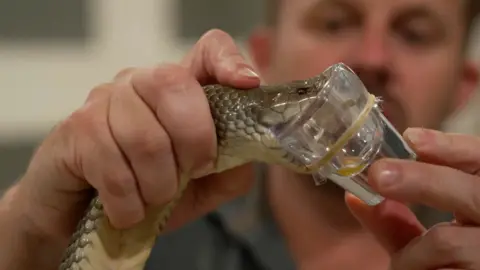
“They are very uninclined to bite but once they go, you just see it pouring out of the fangs,” Mr Collett says, as yellow venom drips to the bottom.
“That is enough to kill all of us in the room five times over – maybe more.”
Then he switches to a more reassuring tone: “They’re not looking for people to bite. We’re too big for them to eat; they don’t want to waste their venom on us. They just want to be left alone.”
“To get bitten by a venomous snake, you’ve got to really annoy it, provoke it,” he adds, noting that bites often occur when someone is trying to kill one of the reptiles.
There’s a fridge in the corner of the room where the raw venom Mr Collett is collecting is stored. It’s full of vials labelled “Death Adder”, “Taipan”, “Tiger Snake” and “Eastern Brown”.
The last of these is the second-most venomous snake in the world, and the one that’s most likely to bite you here, in Australia.
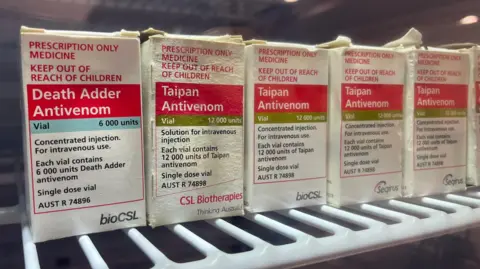
This venom gets freeze-dried and sent to CSL Seqirus, a lab in Melbourne, where it’s turned into an antidote in a process that can take up to 18 months.
The first step is to produce what’s known as hyper-immune plasma. In the case of snakes, controlled doses of the venom are injected into horses, because they are larger animals with a strong immune system.
The venom of Sydney funnel-web spiders goes into rabbits, which are immune to the toxins. The animals are injected with increasing doses to build up their antibodies. In some cases, that step alone can take almost a year.
The animal’s supercharged plasma is removed from the blood, and then the antibodies are isolated from the plasma before they’re bottled, ready to be administered.
CSL Seqirus makes 7,000 vials a year – including snake, spider, stonefish and box jellyfish antivenoms – and they are valid for 36 months. The challenge then is to ensure everyone who needs it has supplies.
“It’s an enormous undertaking,” says Dr Jules Bayliss, who leads the antivenom development team at CSL Seqirus.
“First and foremost we want to see them in major rural and remote areas that these creatures are likely to be in.”
Vials are distributed depending on the species in each area. Taipans, for example, are in northern parts of Australia, so there’s no need for their antivenom in Tasmania.
Antivenom is also given to the Royal Flying Doctors, who access some of the nation’s most remote communities, as well as Australian navy and cargo ships for sailors at risk of sea snake bites.
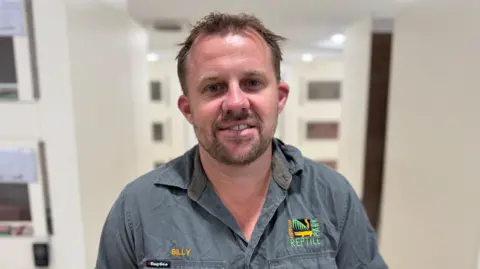
Papua New Guinea also receives about 600 vials a year. The country was once connected to Australia by a land bridge, and shares many of the same snake species, so the Australian government gives the antivenom for free – snake diplomacy, if you like.
“To be honest, we probably have the most impact in Papua New Guinea, more so than Australia, because of the number of snake bites and deaths they have,” says CSL Seqirus executive Chris Larkin. To date, they reckon they’ve saved 2,000 lives.
Back at the park, Mr Collett jokes about the nickname of “danger noodles” that is sometimes given to his serpentine colleagues – a classic Australian trait of making light of something that gives so many visitors nightmares.
Mr Collett, though, is clear: these animals should not put people off from visiting.
“Snakes aren’t just cruising down the streets attacking Brits – it doesn’t work like that,” he jokes.
“If you’re going to get bitten by a snake, Australia’s the best place – we’ve got the best antivenom. It’s free. The treatment is unreal.”

